Research for Change
The Rosalinde and Arthur Gilbert Foundation provided a generous grant to establish the UCLA Law Research for Change Initiative. This program has allowed for direct support of faculty scholars and students in the production of impactful research on important issues of criminal law and policy, and enabled fruitful engagement with the broader criminal legal community
2025-2026 Research for Change Projects
In 2025–2026, the Research for Change Initiative is supporting two impactful faculty research projects. The first project, led by Professor Ingrid Eagly, will create a national database of deportation defense lawyers to better understand how immigrants access legal representation and to analyze the career trajectories of attorneys in this field. The second project, led by Professor Sharon Dolovich, advances the mission of UCLA Law’s Behind Bars Data Project (BBDP), which aims to increase transparency and accountability in American prisons, jails, and detention centers. In an effort to make BBDP’s work broadly accessible, its Research for Change Fellows will be helping to translate for a lay audience quantitative analyses of the raw national data BBDP collects.
2025-2026 Research for Change Fellows
 Hailey Salmonsen (she/her) is a third-year student at UCLA Law. She graduated from Syracuse University with a B.A. in Political Science and Geography. As a TRAC Fellow while still a student at Syracuse, she analyzed remote adjudication of detained immigrants and earned a distinction in political science. During law school, she has worked as a Research Assistant and at the Federal Communications Commission in the Wireline Competition Bureau. Hailey is excited to be a Research for Change Fellow to contribute to systemic change in the immigration court system.
Hailey Salmonsen (she/her) is a third-year student at UCLA Law. She graduated from Syracuse University with a B.A. in Political Science and Geography. As a TRAC Fellow while still a student at Syracuse, she analyzed remote adjudication of detained immigrants and earned a distinction in political science. During law school, she has worked as a Research Assistant and at the Federal Communications Commission in the Wireline Competition Bureau. Hailey is excited to be a Research for Change Fellow to contribute to systemic change in the immigration court system.
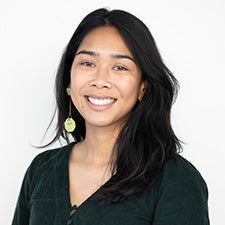 Elizabeth Pring (she/they) is a third-year UCLA Law student. During law school, she served as the Senior Publishing Editor for UCLA Law Review v.73 and interned at the Natural Resources Defense Counsel (NRDC). Prior to law school, Elizabeth worked at the ACLU of Washington, Vera Institute of Justice and Acacia Center for Justice. Through both Vera and Acacia, she worked for the National Qualified Representative Program (NQRP), a national program providing publicly funded legal representation in immigration courts for immigrants with mental health disabilities. She also worked for the Counsel for Children Initiative, at its inception, a program providing legal representation for children forced to appear in immigration court on their own. As a Research for Change Fellow, she is excited to continue her work in immigrant rights advocacy and to identify shortcomings in the U.S. immigration system. She is a graduate from the University of Washington earning a B.A. with honors in Political Science.
Elizabeth Pring (she/they) is a third-year UCLA Law student. During law school, she served as the Senior Publishing Editor for UCLA Law Review v.73 and interned at the Natural Resources Defense Counsel (NRDC). Prior to law school, Elizabeth worked at the ACLU of Washington, Vera Institute of Justice and Acacia Center for Justice. Through both Vera and Acacia, she worked for the National Qualified Representative Program (NQRP), a national program providing publicly funded legal representation in immigration courts for immigrants with mental health disabilities. She also worked for the Counsel for Children Initiative, at its inception, a program providing legal representation for children forced to appear in immigration court on their own. As a Research for Change Fellow, she is excited to continue her work in immigrant rights advocacy and to identify shortcomings in the U.S. immigration system. She is a graduate from the University of Washington earning a B.A. with honors in Political Science.
 Andrew Beale (he/him) is a J.D. candidate at UCLA School of Law. Before law school, he worked as a journalist in the U.S. and around the world, reporting from countries including Mexico, Turkey and Honduras. He holds a bachelor’s in journalism from the University of New Mexico and a Master’s of Journalism from the University of California, Berkeley.
Andrew Beale (he/him) is a J.D. candidate at UCLA School of Law. Before law school, he worked as a journalist in the U.S. and around the world, reporting from countries including Mexico, Turkey and Honduras. He holds a bachelor’s in journalism from the University of New Mexico and a Master’s of Journalism from the University of California, Berkeley.
As a Research for Change Fellow, Andrew works closely with UCLA Law’s Behind Bars Data Project (BBDP) team to present the data gathered to the public in an easily accessible way, including by maintaining the BBDP blog, which features analysis of news and trends in the carceral justice system.
 Abby Branham (she/her) is a third-year UCLA Law student. She graduated from Florida State University with a B.S. in International Affairs and a concentration in Religion. She is a decorated mock trial competitor and has been recognized as a National Champion and Best Advocate at the high school, college, and law school levels. Abby has always aimed to one day leverage her law license on behalf of the vulnerable, specifically those who are victims of our overburdened criminal legal system. During law school, Abby interned with the California Department of Justice's Special Prosecutions Section, a group that has statutory authority to investigate and prosecute officer-involved shootings of unarmed civilians throughout California. As a Research for Change Fellow, Abby supports the work of UCLA Law’s Behind Bars Data Project that investigates prison morbidity and mortality through data compilation. She feels grateful to be a Research for Change Fellow working on behalf of people vulnerable to victimization in our carceral system.
Abby Branham (she/her) is a third-year UCLA Law student. She graduated from Florida State University with a B.S. in International Affairs and a concentration in Religion. She is a decorated mock trial competitor and has been recognized as a National Champion and Best Advocate at the high school, college, and law school levels. Abby has always aimed to one day leverage her law license on behalf of the vulnerable, specifically those who are victims of our overburdened criminal legal system. During law school, Abby interned with the California Department of Justice's Special Prosecutions Section, a group that has statutory authority to investigate and prosecute officer-involved shootings of unarmed civilians throughout California. As a Research for Change Fellow, Abby supports the work of UCLA Law’s Behind Bars Data Project that investigates prison morbidity and mortality through data compilation. She feels grateful to be a Research for Change Fellow working on behalf of people vulnerable to victimization in our carceral system.
 Siena Zarrell (she/her) is a third-year UCLA Law student. During law school, she worked as a Research Assistant and as a Summer Associate at a law firm, where she assisted on pro bono matters such as DACA renewals and advance health care directives for LGBTQ+ clients. Prior to law school, she worked as a law clerk to support recovery initiatives for wildfire victims. She graduated from Vanderbilt University, earning B.A.s with honors in Sociology and Law, History, and Society. As a Research for Change Fellow, she is excited to contribute to meaningful research on legal representation in deportation defense and its implications for immigrant communities.
Siena Zarrell (she/her) is a third-year UCLA Law student. During law school, she worked as a Research Assistant and as a Summer Associate at a law firm, where she assisted on pro bono matters such as DACA renewals and advance health care directives for LGBTQ+ clients. Prior to law school, she worked as a law clerk to support recovery initiatives for wildfire victims. She graduated from Vanderbilt University, earning B.A.s with honors in Sociology and Law, History, and Society. As a Research for Change Fellow, she is excited to contribute to meaningful research on legal representation in deportation defense and its implications for immigrant communities.
Past Research for Change Projects
-
2024-2025 Research for Change Project and Fellows
The 2024-25 Research for Change project is led by UCLA Law Professors Sunita Patel and Jeanne Nishimoto. The project focuses on the policing of veterans while accessing health care. Specifically, researchers will obtain and analyze police records where force was used against patients at the Veterans Healthcare Administration. This investigation will provide insight into how healthcare workers and police interface with unhoused, medically vulnerable, and racialized low-income veteran patients. Research findings from the Research for Change project were featured at a Spring 2025 convening with advocates and panel event at UCLA Law. The National Association of Minority Veterans of America will collaborate with UCLA Law faculty to produce public policy reports based on the data and records the students analyze.
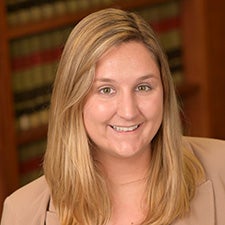 Claire Canestrino (she/her) is a third-year student at UCLA Law. She graduated from the University of Pennsylvania with a B.S. in Economics from the Wharton School. Before law school, Claire worked in clinical research at the Crescenz VA Medical Center in Philadelphia and later at a law firm assisting veterans with their VA disability appeals. Claire is deeply committed to serving as an advocate for the veteran community. Through this Research for Change project, she hopes to enhance her research and data analysis skills in order to contribute to systemic change for veterans accessing VA services.
Claire Canestrino (she/her) is a third-year student at UCLA Law. She graduated from the University of Pennsylvania with a B.S. in Economics from the Wharton School. Before law school, Claire worked in clinical research at the Crescenz VA Medical Center in Philadelphia and later at a law firm assisting veterans with their VA disability appeals. Claire is deeply committed to serving as an advocate for the veteran community. Through this Research for Change project, she hopes to enhance her research and data analysis skills in order to contribute to systemic change for veterans accessing VA services.
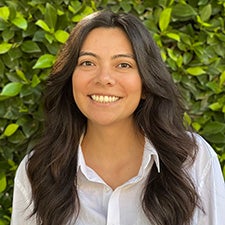 Viviana Gonzalez (she/her) is a third-year student at UCLA Law. She graduated from NYU with a B.A. in Politics and Latino Studies. Prior to and during law school, she has worked at the U.S. Department of Justice’s Civil Rights Division, the U.S. Senate, and various nonprofits advancing systemic changes to policing and corrections. Viviana is excited to be a Research for Change Fellow to continue pushing alternatives to incarceration and punishment that are grounded in care and human dignity.
Viviana Gonzalez (she/her) is a third-year student at UCLA Law. She graduated from NYU with a B.A. in Politics and Latino Studies. Prior to and during law school, she has worked at the U.S. Department of Justice’s Civil Rights Division, the U.S. Senate, and various nonprofits advancing systemic changes to policing and corrections. Viviana is excited to be a Research for Change Fellow to continue pushing alternatives to incarceration and punishment that are grounded in care and human dignity.
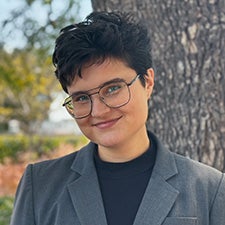 Ania Korpanty (they/them) is a third-year student at UCLA Law specializing in Critical Race Studies. They graduated from Emory University with a B.A. in Political Science and a minor in Spanish. During their time at UCLA Law, they have been involved in advocating for the education rights of students across Southern California, including LGBTQIA+ students and students with disabilities. Throughout this advocacy work, Ania has witnessed the ways in which the police state targets folks from marginalized communities. Through the Research for Change fellowship, Ania is looking forward to learning more about the intersection between veterans’ rights, housing, and disability law.
Ania Korpanty (they/them) is a third-year student at UCLA Law specializing in Critical Race Studies. They graduated from Emory University with a B.A. in Political Science and a minor in Spanish. During their time at UCLA Law, they have been involved in advocating for the education rights of students across Southern California, including LGBTQIA+ students and students with disabilities. Throughout this advocacy work, Ania has witnessed the ways in which the police state targets folks from marginalized communities. Through the Research for Change fellowship, Ania is looking forward to learning more about the intersection between veterans’ rights, housing, and disability law. -
2022-2023 Research for Change Project and Fellows
Our 2022-2023 Research for Change Project focused on Restorative Justice in California. Restorative justice (RJ) is a practice and theory rooted in and developed from indigenous practices. At its core, RJ is about relationships: how you create them, maintain them, and mend them. It is based on the philosophy that we are all interconnected, that we live in relationship with one another, and that safety and justice exist at the level of healthy relationships. Grounded in this idea of interconnectedness, restorative justice can prevent harm from occurring and provide an alternative way of addressing harm. When harm happens, it is seen as a wound in the community and a tear in the web of relationships. Because we are all interconnected, harm ripples out to disrupt the whole web—a harm to one is a harm to all. Restorative justice practices provide an opportunity for people most directly impacted by an incident of harm to voluntarily and collectively determine a path forward to begin the journey of healing, transforming relationships and accountability.
This year, the consortium worked in collaboration with Impact Justice, Community Works West, and The Ahimsa Collective to conduct research and analysis on prospective RJ legislation in California. We hosted a convening of California RJ organizations at UCLA and we produced a report documenting the process of forming a statewide RJ policy coalition.
Our 2022-2023 Research for Change report, "The Promise and Perils of Restorative Justice Legislation in California", provides an in depth look at RJ legislation across the country, analyzes results from focus groups of RJ practitioners in California to understand how legislation could support or detract from their work, and discusses a pending piece of legislation in the California legislature on restorative justice.
2022-2023 Research for Change Fellows
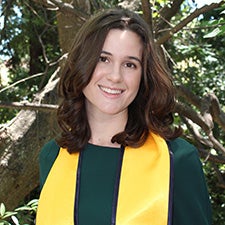 Emma Engler (she/hers) is a second-year student at UCLA Law. She has worked and volunteered with various agencies and nonprofit organizations in Los Angeles, including the Los Angeles County Public Defender’s Office, Brilliant Corners, the Los Angeles County District Attorney’s Office, and the Van Nuys Courthouse Self-Help Center. She is grateful that she gets to give back to her community through local pro-bono work as she develops as a community lawyer at UCLA. As a Research for Change Fellow, she hopes to expand opportunities for those who have been harmed to control their own healing. For those who have caused harm, she hopes the research will help them meaningfully reconcile with and rejoin their communities.
Emma Engler (she/hers) is a second-year student at UCLA Law. She has worked and volunteered with various agencies and nonprofit organizations in Los Angeles, including the Los Angeles County Public Defender’s Office, Brilliant Corners, the Los Angeles County District Attorney’s Office, and the Van Nuys Courthouse Self-Help Center. She is grateful that she gets to give back to her community through local pro-bono work as she develops as a community lawyer at UCLA. As a Research for Change Fellow, she hopes to expand opportunities for those who have been harmed to control their own healing. For those who have caused harm, she hopes the research will help them meaningfully reconcile with and rejoin their communities.
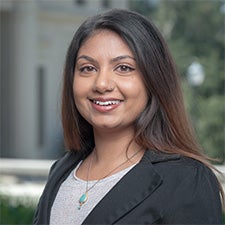 Eushrah Hossain (she/hers) is a third-year law student specializing in Critical Race Studies and Public Interest Law and Policy. She is from Albuquerque, New Mexico and graduated from Occidental College with a B.A. in Cognitive Science and minor in Philosophy. Prior to law school, Eushrah worked at the Albuquerque District Attorney's office on pre-prosecution diversion efforts and at a nonprofit that offers mental health services to foster children and youth in juvenile detention in Los Angeles. Eushrah is excited to be a Research for Change Fellow because she believes restorative justice offers a clear path towards abolition and important tools for individual and community healing.
Eushrah Hossain (she/hers) is a third-year law student specializing in Critical Race Studies and Public Interest Law and Policy. She is from Albuquerque, New Mexico and graduated from Occidental College with a B.A. in Cognitive Science and minor in Philosophy. Prior to law school, Eushrah worked at the Albuquerque District Attorney's office on pre-prosecution diversion efforts and at a nonprofit that offers mental health services to foster children and youth in juvenile detention in Los Angeles. Eushrah is excited to be a Research for Change Fellow because she believes restorative justice offers a clear path towards abolition and important tools for individual and community healing.
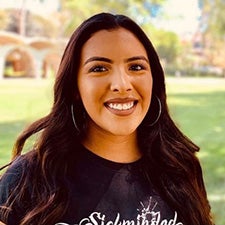 Brisely Martinez (she/her/ella) is a second-year law student at UCLA Law specializing in Critical Race Studies and part of the PILP community! She attended UC Riverside for undergrad and majored in Sociology. As a system impacted person who experienced the incarceration of her sibling, Brisely has always been passionate about advocating with people directly impacted by the criminal legal system. Prior to attending law school Brisely co-founded the Underground Scholars Initiative at UCR to advocate with formerly incarcerated and system impacted students and worked with youth in Riverside and Fresno who were directly impacted by the juvenile justice system either by probation or incarceration. She also supported formerly incarcerated youth’s local policy advocacy and youth justice coalition in Fresno and advocated for youth care and healing over youth caging at a statewide policy level with the California Alliance Youth & Community Justice. Brisely is excited about being a Research for Change Fellow to continue pushing alternatives to incarceration and punishment that are rooted in care, healing, and human dignity.
Brisely Martinez (she/her/ella) is a second-year law student at UCLA Law specializing in Critical Race Studies and part of the PILP community! She attended UC Riverside for undergrad and majored in Sociology. As a system impacted person who experienced the incarceration of her sibling, Brisely has always been passionate about advocating with people directly impacted by the criminal legal system. Prior to attending law school Brisely co-founded the Underground Scholars Initiative at UCR to advocate with formerly incarcerated and system impacted students and worked with youth in Riverside and Fresno who were directly impacted by the juvenile justice system either by probation or incarceration. She also supported formerly incarcerated youth’s local policy advocacy and youth justice coalition in Fresno and advocated for youth care and healing over youth caging at a statewide policy level with the California Alliance Youth & Community Justice. Brisely is excited about being a Research for Change Fellow to continue pushing alternatives to incarceration and punishment that are rooted in care, healing, and human dignity.
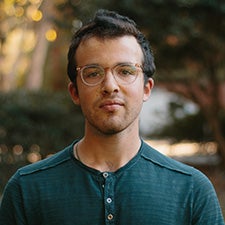 Isaiah Zeavin-Moss (he/him) is a second-year law student from Brooklyn, New York. He graduated from the University of Michigan in 2018, where he double majored in English Language & Literature and American Studies. Before law school, he worked as an elementary school teacher in Brooklyn and the South Bronx. Isaiah is thrilled to be a Research for Change Fellow because he wants to learn about and amplify abolitionist responses to harm that provide healing and redress, rather than cruelty and excommunication.
Isaiah Zeavin-Moss (he/him) is a second-year law student from Brooklyn, New York. He graduated from the University of Michigan in 2018, where he double majored in English Language & Literature and American Studies. Before law school, he worked as an elementary school teacher in Brooklyn and the South Bronx. Isaiah is thrilled to be a Research for Change Fellow because he wants to learn about and amplify abolitionist responses to harm that provide healing and redress, rather than cruelty and excommunication.